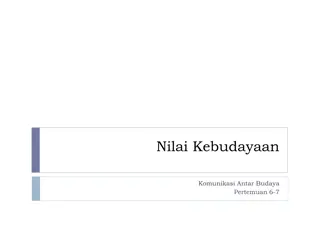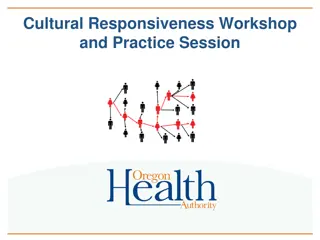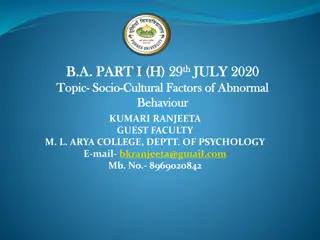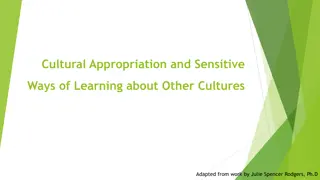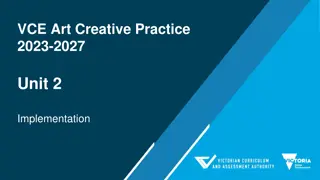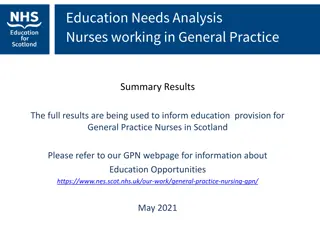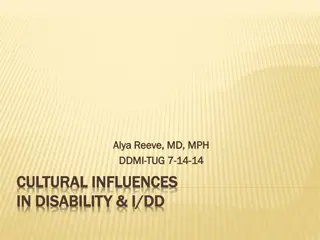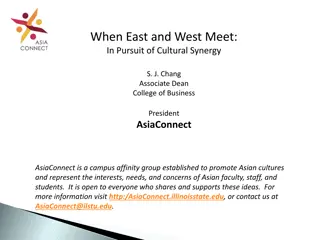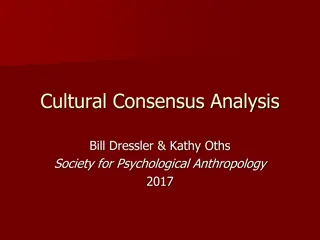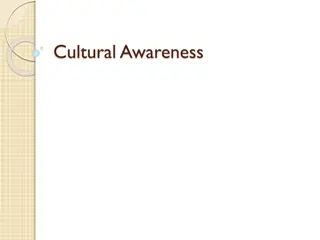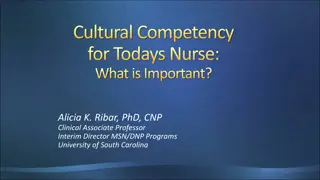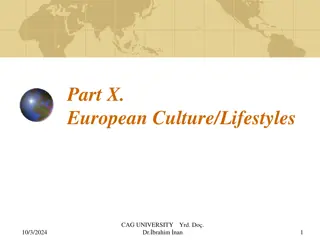Understanding Cultural Influences on UK General Practice
Explore the impact of culture on UK general practice, delving into the dimensions of culture, differences between East and West, and dominant cultural themes. Learn how cultural dynamics affect patient presentations and relationships in the medical field. Gain insights into navigating linguistic and cultural capital for success in healthcare settings.
Download Presentation

Please find below an Image/Link to download the presentation.
The content on the website is provided AS IS for your information and personal use only. It may not be sold, licensed, or shared on other websites without obtaining consent from the author. Download presentation by click this link. If you encounter any issues during the download, it is possible that the publisher has removed the file from their server.
E N D
Presentation Transcript
Date of presentation Culture and how it affects UK GP General Practice Anjla Sharman PD Equality in Training
Objectives Discuss the different dimensions of culture and identify key differences between the East and West Consider how culture impacts on relationships with patients and colleagues Discuss linguistic and cultural capital Tips for success www.hee.nhs.uk East Midlands Local Education and Training Board
Introductions What is your name? Who named you? Does your name have any meaning, if so what? www.hee.nhs.uk East Midlands Local Education and Training Board
Culture Collective programming of mind which distinguishes the members of one group of people from another and leads them to live their lives in ways that are shaped by unwritten social codes... Social codes are revealed in patterns of thinking, feeling and acting... (Hofstede 1991) www.hee.nhs.uk East Midlands Local Education and Training Board
Differences between East and West www.hee.nhs.uk East Midlands Local Education and Training Board
Dimensions of Culture An aspect of culture which can be measured relative to other cultures: Five dimensions: Authority v submission Individualism v collectivism Uncertainty v certainty Short-term v longterm Masculinity v femininity www.hee.nhs.uk East Midlands Local Education and Training Board
Dominant Cultural Themes East West Large power distance Collectivist Masculine Uncertainty avoiding Short-term orientation Small power distance Individual Feminine Uncertainty accepting Long-term orientation to future www.hee.nhs.uk East Midlands Local Education and Training Board
www.hee.nhs.uk East Midlands Local Education and Training Board
Cultural Dimensions patient presentations East Emotion can be shown Fear of ambiguous situations Resistance to innovation Structured environment with clear solutions Doctor must supply right solution promptly Belief in experts and specialization Few nurses, many doctors West Emotion not to be shown Comfortable with ambiguous situations Curiosity re innovations Open-ended situation with discussion Dr may say: I don t know Belief in generalists Many nurses, few doctors www.hee.nhs.uk East Midlands Local Education and Training Board
www.hee.nhs.uk East Midlands Local Education and Training Board
Cultural Dimensions doctor presentations West East Patient expected to have an opinion Doctors use intuition and strive for consensus Task prevails over relationship Effectiveness measured over longer term Direct confrontation tolerated Concern with maintaining professional relationship Doctors are gurus and take initiative Leaders should be assertive and decisive Relationships prevail Effectiveness measured in short-term fast results Direct confrontation avoided Concern with maintaining personal face www.hee.nhs.uk East Midlands Local Education and Training Board
www.hee.nhs.uk East Midlands Local Education and Training Board
Cultural Dimensions educational presentations Eastern students Competitive with peers Western Educators Value co-operation and team- work Enjoy students who question and debate Seek student participation shared learning Expect students to undertake self directed learning Educators are wise parents tendency to subservience Historically used to passive learning - may struggle with self directed learning Maybe uncertain re their progress compared with peers. Fear of losing face Learning from mistakes www.hee.nhs.uk East Midlands Local Education and Training Board
www.hee.nhs.uk East Midlands Local Education and Training Board
Language and Communication Different aspects to consider, including: Language (colloquialisms, pronunciation, accent) Style of language Language use eg humour, irony, understatement Non verbal behaviour Paralinguistic features eg emphasis, tone, pace... Conversation structure eg silence, taking turns... Manners cultural rules eg greetings, politeness, expressing emotions, saying no... www.hee.nhs.uk East Midlands Local Education and Training Board
www.hee.nhs.uk East Midlands Local Education and Training Board
Linguistic and cultural capital Linguistic capital mastery of language and non verbal communication Social capital personal resources based on group membership, relationships, support Cultural capital knowledge , skills, education www.hee.nhs.uk East Midlands Local Education and Training Board
Implications Stress affects your ability to use linguistic capital With less linguistic capital, trainees may over-model (formulaic phrases) May affect ability to demonstrate empathy and sensitivity www.hee.nhs.uk East Midlands Local Education and Training Board
General solutions Recognise issues at an early stage and recognise need to be pro-active re solutions Language - listening to UK tv and radio, read English papers Speak English at home, with peers Culture join social groups eg book clubs, sports teams... Get involved in informal aspects of life eg practice and scheme social events www.hee.nhs.uk East Midlands Local Education and Training Board
In the practice Communication skills Give trainers permission to discuss English language/style Joint surgeries Increased use of videos/COTS Tutorials on ethics, professionalism, sensitive areas such as sex, death Be curious about patient s lives Practice ways to explain conditions www.hee.nhs.uk East Midlands Local Education and Training Board
Summary Culture is a factor in the way in which learning and subsequent work is approached Behaviours are influenced by culture and relate to differing ways of perceiving situations Be aware of importance of linguistic and cultural capital and actively work to improve both www.hee.nhs.uk East Midlands Local Education and Training Board



